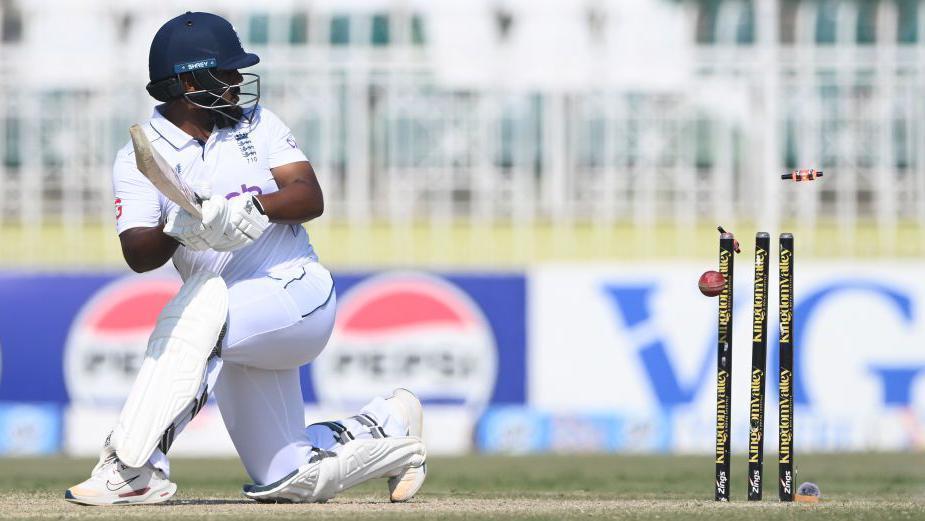ARTICLE AD BOX
 Image source, Getty Images
Image source, Getty Images
England were beaten by nine wickets in the third and deciding Test against Pakistan
BBC Cricket Correspondent
Most people expected England to lose the third Test in Pakistan before the third day was out.
But to lose by lunch was a throwback to some bad old days of England tours past. The batting crumbled to their lowest total in a Test in Pakistan, 112, and the home side had the series won soon after.
Even before Saturday, England have not been at the races in this match.
They were 100 runs short in their first innings after enjoying the advantage of winning the toss, then they drifted through the second day as Saud Shakeel was compiling a vital century.
This Test was a strange spectacle, with giant fans and patio heaters used on the surface in Rawalpindi. I don't think I've ever seen a pitch prodded and poked so much before a game.
As it turned out, the conditions were not that bad, and far from unplayable. Publicly, England made all the right noises and did not complain, though one does wonder what was said in the dressing room. It certainly appeared like there were some demons lurking at the back of the mind.
Ben Stokes' dismissal on the final day, playing no shot to a straight ball from Noman Ali, was a complete brain fade from one of the most clear-thinking cricketers I've ever seen. Stokes usually has such clarity about his game. To see such an error in judgement is really unusual.
Jamie Smith's run and swipe at Sajid Khan was horrendous, especially with Joe Root not out at the other end. It was rabbit-in-the-headlights stuff. Incredibly disappointing.
Pakistan show England the way
We must congratulate Pakistan, who picked themselves up from being flattened in the first Test to earn their first home series win in almost four years.
Sajid brought such an energy after he was recalled for the second Test. He really grabbed the entire Pakistan team by the scruff of the neck. The off-spinner is passionate and aggressive, just the kind of individual you want in your team. To see young fans twirling imaginary moustaches as he walked off the field showed just what a character he is.
Sajid was able to thrive in conditions completely different to those of the first Test. The pitches Pakistan prepared turned the series on its head.
Conditions provide mitigation to England's performances, not an excuse. It is not impossible for a visiting team to win in Asia – New Zealand have shown that in India.
England lack consistency. In 14 Tests this year they have won seven and lost seven. Those of us who watch them regularly get frustrated because we know how good they can be. Until they find that consistency, questions will remain over certain players and the methods England employ.
We can point to a habitual and historic struggle in the subcontinent and on slow, turning pitches in other parts of the world. Just look at the past year. England have lost Test series in India and Pakistan, were awful in the 50-over World Cup in India and then struggled at the T20 World Cup in the Caribbean.
On this occasion, the England spinners were shown up by Pakistan's crafty campaigners Sajid and Noman. With the bat, Shakeel's hundred on Friday was a masterclass. Brendon McCullum talked about Shakeel dishing out "death by a thousand cuts", in complimentary fashion. How many times has McCullum asked his players to play such a knock? Not very often would be my guess.
A wider context to England's usual struggle in this part of the world would be the uncomfortable question of whether it matters enough. We have heard this England team, like so many others, talk about the Ashes in Australia next year.
These tours, often in India, usually come with an Ashes right around the corner, and therefore England fall into the trap of viewing their results through the prism of success against the Aussies.
It is true that Ashes series can make or break the careers of English cricketers, but Test matches are played all over the world and in all sorts of conditions. The very best teams win all over the place. Winning and losing matters, no matter who you are playing.
England need Pope and Stokes to find consistency
Image source, Getty Images
Image caption,Ollie Pope and Ben Stokes both had lean series with the bat against Pakistan
Both now and for the trip to Australia next year, England need a consistent number three and the best possible version of Stokes.
Ollie Pope is baffling. When he gets in, he makes teams pay, and his hundreds are regularly big hundreds. It's the getting in that has become the problem.
He got a good ball in the second innings in Rawalpindi. He was sucked in by the guile of Noman. It is the sort of thing that happens when you're out of form.
The New Zealand tour now looks like a really big series for Pope, because he doesn't want to be giving England a decision to make. He should think long and hard about giving the first 30 balls of his innings to the bowlers, to make sure he is still in at the end of that period. Pope doesn't have to look far for an example, because Root is one of the very best at it.
Stokes hasn't played for so long and hasn't been himself. The captain had more than two months out with a hamstring injury and was feeling his way back.
There were times when it looked like he had quite a lot on his mind and he admitted it has felt like a long tour.
What Stokes has in his favour is a sound technique. He will come good, of that I have no doubt. It might do him good that England's next Test is in Christchurch, where he will be surrounded by a lot of family and friends.
Standout moments from 33 years as correspondent
Image source, Getty Images
Image caption,Aggers joined in with England's sprinkler celebration after they secured a 3-1 win in the 2010-11 Ashes in Australia
And, with that, my 33-plus years as the BBC's cricket correspondent come to an end.
There have been two aspects to my job. One is presenting Test Match Special, the other is being responsible for news coverage.
There's been a little bit of confusion. I am not leaving TMS and will carry on as normal with that programme. It's the news I'm handing over and it's definitely the right time to do so.
The game has changed. It is so much more about franchise leagues. I like T20 cricket, but find it hard to get excited about leagues that are simply the same players shuffled into a different shirt from the one they were playing in two weeks prior.
TMS means the world to me. I feel like the bridge between a bygone age of Brian Johnston and Fred Trueman, to a new era involving the likes of Steven Finn and Alex Hartley.
Looking back, it was just a bunch of middle-aged white blokes, or even a bunch of late-aged white blokes. Now the modern TMS team is nothing like that. I'm very proud of what we have achieved.
As correspondent, the biggest story I covered was South Africa's readmission to world sport, with cricket leading the way. I got to interview Nelson Mandela. People say sport and politics shouldn't mix, but sometimes they do. When it works, it can be such a force for good.
Allen Stanford was a huge story, as was the fallout from the Kevin Pietersen row. The KP saga felt so divisive, at a time when social media was really starting to take hold.
My favourite moment, without a doubt, was the end of England's victorious 2010-11 Ashes campaign in Australia.
We had won down under for the first and only time in my life working for the BBC. There was a spare pass in the commentary box and I was able to slip it around the neck of my wife, Emma, and take her on to the pitch with me.
She was there as I was talking to the England players, drinking in the celebrations and seeing the delight of the travelling fans in the crowd.
Mine has been a very selfish job, yet in that moment I was able to show Emma just why I do it. It was the absolute best.
Jonathan Agnew was speaking to BBC chief cricket writer Stephan Shemilt.

 4 weeks ago
7
4 weeks ago
7








 English (US)
English (US)